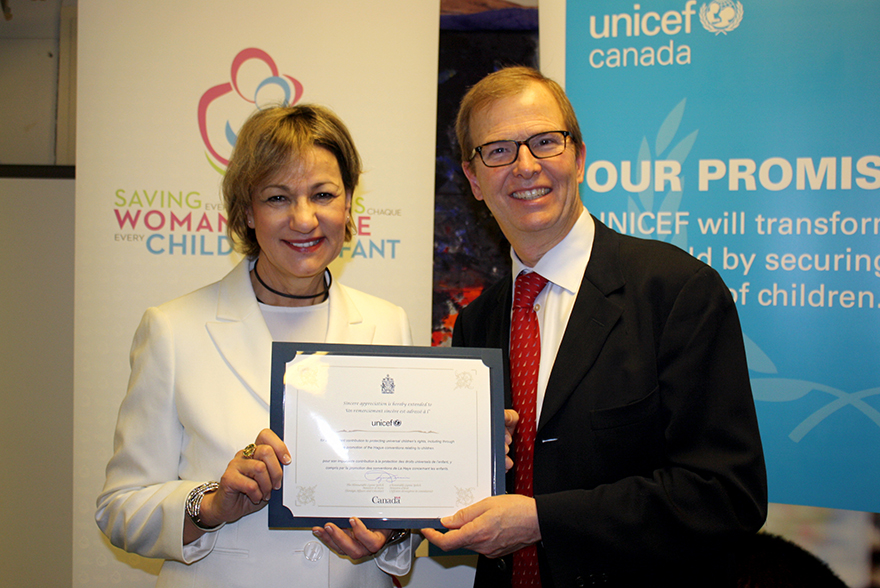Minister Yelich Reconfirms Canada’s Commitment to Children in Advance of National Missing Children’s Day
May 23, 2014 - The Honourable Lynne Yelich, Minister of State (Foreign Affairs and Consular), today recognized National Missing Children’s Day, observed every year on May 25, by reconfirming the Government of Canada’s commitment to addressing consular issues that affect Canadian children.
“Cases involving children are complex and often come with no easy solution,” said Minister Yelich. “Sadly, the number of children’s cases, including those involving abduction, is increasing at an alarming rate. To address this trend, our government is placing a priority on children through our approach to consular services so we can better equip ourselves to prevent and assist in cases affecting Canada’s most vulnerable.”
In November 2013, Minister Yelich launched the Vulnerable Children’s Consular Unit at Foreign Affairs, Trade and Development Canada. Through an increased number of specialized case officers and dedicated policy advisers who focus solely on children’s issues, Canada hopes to resolve more cases, more quickly. The Government of Canada has created A Guidebook for Left-Behind Parents so parents can have step-by-step instructions on what to do to prevent an international abduction and on what actions to take once an abduction has occurred.
Canada is also strengthening cooperation with its partners. On May 13, Minister Yelich recognized UNICEF for its work in advocating for greater protection for abducted children and promoting the Hague conventions on children, including the Convention on the Civil Aspects of International Child Abduction.

May 13, 2014 - Toronto, Ontario - Minister Yelich presents a ministerial citation to UNICEF; David Morley, President and CEO of UNICEF Canada, accepts on behalf of the global organization.
“Operating in more than 190 countries, UNICEF works to address the illicit abduction of children and to strengthen family law institutions across the world, which has been instrumental to our shared efforts,” said Minister Yelich. “We look forward to continuing our work with UNICEF to improve international measures dealing with missing and abducted children.”
“We would like to thank Minister Yelich and the Government of Canada for this recognition,” said David Morley, UNICEF Canada’s President and CEO. “Ensuring children are well protected from abduction and can cross borders safely and rely on effective child protection systems to support them is a key priority for UNICEF in Canada and around the world.”
For more information, visit Travelling with Children.
A backgrounder follows.
- 30 -
For further information, media representatives may contact:
Saro Khatchadourian
Press Secretary
Office of the Minister of State (Foreign Affairs and Consular)
613-944-2300
Saro.Khatchadourian@international.gc.ca
Media Relations Office
Foreign Affairs, Trade and Development Canada
343-203-7700
media@international.gc.ca
Follow us on Twitter: @DFATDCanada or @travelGoC
Like us on Facebook: Foreign Affairs, Trade and Development Canada-DFATD
Backgrounder - International Child Abduction
Children and Travel
The Vulnerable Children’s Consular Unit at Foreign Affairs, Trade and Development Canada increased the number of regionally specialized case officers available to assist left-behind parents and family members. The unit also enhanced Canada’s policy capacity by including dedicated analysts who deal solely with issues relating to children travelling abroad. The unit works with other government departments and its provincial and territorial counterparts on joint efforts and issues involving missing children.
Resources to help left-behind and fearful parents facing such a difficult and complex situation are also available. International Child Abduction: A Guidebook for Left-Behind Parents is a publication designed to help parents understand the processes and issues involved in preventing and dealing with abduction, including searching for and trying to bring back a child.
If a custody dispute arises while a child is abroad or it is suspected that a parent or family member is planning to abduct a child, parents or guardians should contact the Case Management Division of Foreign Affairs, Trade and Development Canada. For contact information, please consult Emergency Watch and Response Centre.
The Hague Convention on International Child Abduction
The Hague Convention of 25 October 1980 on the Civil Aspects of International Child Abduction is a multilateral treaty seeking to protect children under the age of 16 from the harmful effects of wrongful removal and retention across international boundaries. It facilitates the prompt return of the child to the child’s habitual residence and works to ensure respect for rights of custody and of access under the laws of its contracting states. The Hague Convention was concluded on October 25, 1980, and entered into force internationally on December 1, 1983.
The Convention, which applies to all provinces and territories, was ratified by Canada in 1983. Canada currently applies the Convention with 71 contracting states.
UNICEF
UNICEF is the United Nations children’s agency. Often in partnership with legal experts from the Hague, UNICEF works in 52 countries to promote the implementation of the Hague children’s conventions. UNICEF also provides technical support and training to judges and to government and child protection officials so they can apply the conventions effectively. These conventions include the 1993 Convention on Protection of Children and Co-Operation in Respect of Intercountry Adoption, the 1980 Hague Convention on the Civil Aspects of International Child Abduction, and the 1996 Hague Convention on Parental Responsibility and Protection of Children. Increasing a country’s capacity to implement these conventions strengthens national and local systems that help protect children from abuse, exploitation and abduction.
- Date Modified: